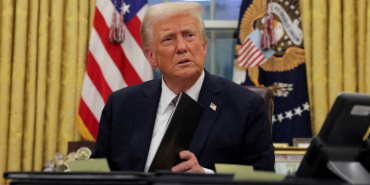Trump Administration Moves to Protect Migrant Children from Criminal Abuse

The Trump administration is intensifying efforts to reform the system for placing unaccompanied minors in the United States, aiming to address vulnerabilities that have led to abuse and exploitation.
The overhaul is predicated on concerns that the existing sponsorship system, designed to provide safety and stability for vulnerable children, has been compromised by widespread fraud and inadequate vetting procedures.
The renewed focus comes amid a backdrop of heightened scrutiny of immigration policies and a reported decline in border crossings. According to Customs and Border Protection (CBP) data, apprehensions at the southern border plummeted in April 2025 to an average of 279 arrests per day, a sharp contrast to the 4,297 daily arrests recorded in April 2024.
Total apprehensions for April 2025 totalled 8,383, significantly lower than the 129,000 recorded during the same period last year. The Trump administration asserts that this reduction in border crossings has allowed Border Patrol agents to refocus on national security concerns and address systemic flaws within the immigration framework. One area of primary concern is the sponsorship system for unaccompanied minors, which has been criticised for allowing fraudulent applications to proliferate.
Chris Clem, a retired Border Patrol chief with nearly three decades of experience, is playing a central role in advising the administration on these reforms. Clem, drawing on his extensive expertise, is working with officials to improve vetting processes for sponsors of unaccompanied minors, addressing what he describes as a pervasive problem of fraudulent applications. According to Clem, an estimated 70% of sponsor applications contain inaccurate, unverifiable, or deliberately falsified information.
The consequences of these flawed applications can be devastating, as highlighted by a recent case in Ohio where a 14-year-old girl was placed with a man who falsely claimed to be her adult brother. The girl was subsequently subjected to sexual assault and became pregnant. While federal authorities initially declined to pursue fraud charges, state prosecutors intervened, and the suspect was ultimately indicted on multiple charges, including trafficking and deception.
Clem asserts that this case is not an isolated incident, emphasizing that there are “literally thousands” of similar cases involving assault and abuse of migrant children placed with fraudulent sponsors. The Trump administration is now aiming to address these systemic vulnerabilities through a series of reforms designed to strengthen verification processes, conduct more rigorous background checks, increase collaboration between federal agencies, and swiftly investigate and prosecute fraudulent sponsorship claims.
The Department of Health and Human Services (HHS) is working alongside Clem to restructure protocols, ensuring that sponsors provide legitimate and verifiable documentation. These efforts are intended to prevent minors from falling into the hands of individuals who may exploit their vulnerability. In addition to tightening security within the sponsorship system, the Trump administration is also pursuing stronger border security measures. The decline in border crossings has allowed Border Patrol agents to conduct targeted operations aimed at tracking down individuals who previously evaded capture.
The administration's renewed focus on security extends beyond border enforcement, with officials actively pursuing individuals and organisations complicit in immigration-related fraud. This includes smugglers, traffickers, and even government personnel who facilitate unlawful activities. Clem warns that any officials—whether politicians, judges, or attorneys—who knowingly aid and abet illegal immigration will face consequences, signaling a broader effort to dismantle criminal networks involved in human trafficking and document fraud.
Border Patrol agents in high-traffic regions, such as Yuma, Arizona, have experienced a significant shift in their daily operations. At the height of the border crisis under the Biden administration, agents in Yuma averaged over 1,000 arrests daily. That number has now plummeted to just four arrests per day. The reduced strain on personnel has allowed agents to return to conventional enforcement duties, such as patrolling border regions, investigating criminal activities, and coordinating with state and federal law enforcement agencies.
Clem highlights that these changes have boosted morale among officers, allowing them to fully dedicate their efforts to securing the border and preventing illegal activity. The Trump administration’s immigration strategy reflects a decisive shift toward enforcement and reform, with a focus on fraudulent sponsorship claims and tightening border security. Officials aim to prevent abuse, trafficking, and exploitation of vulnerable minors, and have vowed to leave no stone unturned in their pursuit of justice for victims and accountability for those who engage in fraudulent practices.








Add new comment